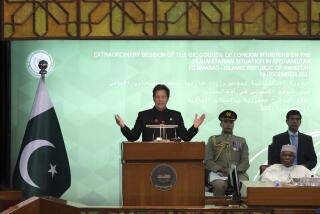Afghans at Conference Sort Through Candidates for Interim Government
- Share via
KOENIGSWINTER, Germany — After a full week of U.N.-mediated talks, Afghan leaders delved Monday into the tough work of seating an interim government, mulling over specific candidates to lead their country for the next few months.
The belated submission of names for the top posts marked an advance into the final and most difficult stage of the conference, designed to lay out a return to peace and representative government in Afghanistan after almost 23 years of war.
As delegates of the four Afghan factions hammered out a text outlining the transition to democracy, there were also confusing signals from the Afghan capital, Kabul. Leaders of the dominant Northern Alliance there forwarded four names for consideration as de facto prime minister in a 29-member Cabinet that would serve for up to six months. During that time, a national council of elders called a loya jirga would be organized, drawing representatives from all 30 provinces to name a transitional parliament, draft a constitution and prepare for elections in about two years.
According to the latest version of the U.N.-drafted blueprint, Afghanistan’s deposed king, Mohammad Zaher Shah, would be asked to nominate the leader of the interim Cabinet. Three of the four names put forward by the alliance are supporters of the king, and one of them, Hamid Karzai, was thought to be favored.
Karzai, a deputy prime minister during the first chaotic years after Soviet troops retreated in 1989, is a Pushtun--a member of the largest Afghan ethnic group--and would be an acceptable choice for most of the political, ethnic and religious leaders gathered here. Karzai recently returned to Afghanistan from exile to lead the battle against the last stronghold of the Taliban regime, the southern city of Kandahar. A well-educated religious moderate who speaks English fluently and has contacts abroad, he is seen as a compromise between the regional warlords and Afghan exiles, like the former king, who have long been out of touch with the Afghanistan they left decades ago.
Another figure put forward by the alliance from Kabul was Abdul Sattar Sirat, head of the exmonarch’s delegation here and a former justice minister during the reign of the king, which ended with a palace coup in 1973. He is a professor of Islamic studies with a home in San Marcos, Calif., although he has been in Rome to advise Zaher Shah since September.
Though Sirat is respected, he has been living outside his native country for nearly three decades.
The other names advanced were Sibghatullah Mojaddidi, who briefly served as acting president in 1992, and Pir Sayed Ahmad Gailani, a supporter of the king who heads one of the exile factions, called the Peshawar group.
Conference organizers have been worried about the mixed signals coming out of Kabul. Demands by alliance political leader Burhanuddin Rabbani have directly contradicted what alliance negotiators here have been saying.
The chief delegate of the alliance’s United Front, Younis Qanooni, pledged his faction’s commitment to share power with other Afghan groups despite the alliance’s occupation of the capital after the Taliban retreated from there Nov. 13.
But Rabbani last week deemed unacceptable the delegates’ agreement to provide a prominent transitional role for the former king and a multinational peacekeeping force. He has also proposed a more elaborate interim governing structure and suggested that he should head it. The alliance’s acting deputy prime minister, Abdur Rasool Sayyaf, told reporters in Kabul on Monday, however, that Rabbani had agreed to accept any of the four names forwarded here.
Rabbani has apparently been bypassed, one European diplomat here said, noting that three younger figures in the main Jamiat-i-Islami party within the seven-faction alliance have emerged. They are Foreign Minister Abdullah, Interior Minister Qanooni and Defense Minister Mohammed Qassim Fahim. The acting leadership in Kabul will be dissolved once a new Cabinet is named here, but the three are expected to return to their posts as members of the U.N.-recognized interim body.
The conference delegates got down to work pondering personalities for the Cabinet posts only late Monday, and diplomats monitoring the talks said it could be several days before decisions are made.
U.N. spokesman Ahmed Fawzi continued to put an optimistic spin on the talks, saying an agreement could be reached within 24 hours.
Afghanistan has been promised billions of dollars in reconstruction aid from U.N. member states, but only when it has a broad-based government in power with which foreign donors can work.
More to Read
Sign up for Essential California
The most important California stories and recommendations in your inbox every morning.
You may occasionally receive promotional content from the Los Angeles Times.














